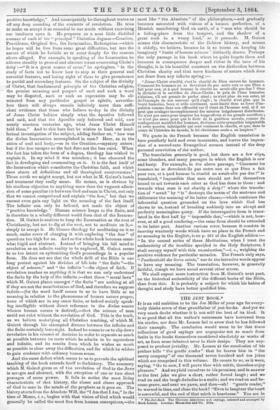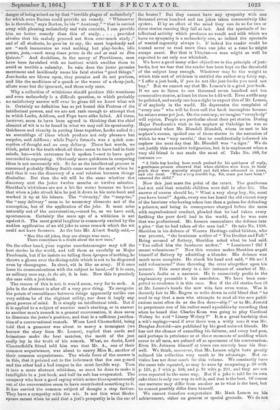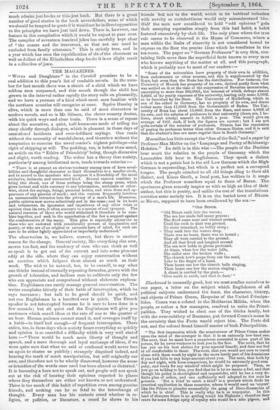THE JEST BOOK.* Iv is an odd ambition to be
the Joe Miller of your age for every- body thinks scorn of that grandfather of jest-books. And yet we very much doubt whether it is not still the best of its kind. It is so good that all the author's successors have borrowed from his stories, nor does Mr. Lemon fail to avow that he has followed their example. The conclusion would seem to be that these collections of good sayings are unpopular not so much from faults in the books themselves considered absolutely as works of art, as from some inherent error in their design. They are sup- posed to produce joviality. Mr. Lemon at the conclusion of his preface tells "the gentle reader" that he leaves him in "the merry company" of one thousand seven hundred and ten jokes which are comprised in this volume. He comes to us, as it were, saying, " Go to now, I will prove thee with mirth, therefore enjoy pleasure." And we yield ourselves to his promisee, and in answer to the first joke we give a short, rather forced laugh ; and we read on and the laugh dwindles to a smile; and we read on and be- come grave, and next we yawn, and then—alt! "gentle reader," be warned in time, and close the book! "Even in laughter the heart is sorrowful, and the end of that mirth is heaviness." You are in
• M./est-Book. Tbe Choicest Anecdotes and saying; selected and arranged by Mark Lemon. London; Macrallan and Co. 1864.
danger of being seized on by that "terrible plague of melancholy" for which even Burton could provide no remedy. "Whosoever he is therefore," says Burton, in his "Anatomy," "that is carried away with pleasing melancholy and vain conceits, I can provide him no better remedy than this of study provided alwaies that his malady proceed not from over-much study ;" and of all students, he goes'on to say, the most hopelessly sad are "such inamoratos as read nothing but play-books, idle poems, jests,—such many times prove in the end as mad as Don Quixote." And doubtless, in the mercy of Providence, men have been furnished with an instinct which enables them to avoid so terrible a calamity. In vain does the jester promise merriment and insidiously name his fatal stories "good things." Jest-books are blown upon, they promise and do not perform, and like the medicines of a quack or the wares of a cheap-jack, allure none but the ignorant, and those only once.
Why a collection of witticisms should produce this weariness and even melancholy is a difficult question, to which probably no satisfactory answer will ever be given till we know what wit is. Certainly no definition has as yet bound this Proteue of the intellectual powers, and we are not rash enough to attempt that in which Locke, Addison, and Pope have alike failed. All three, however, seem to have been agreed in thinking that the chief element of wit is to be found in what we may call its spontaneity. Quickness and vivacity in putting ideas together, Locke called it ; an assemblage of ideas which produce not only pleasure but surprise, said Addison ; while Pope's formula was a quick con- ception of thought and an easy delivery. These last words, we think, point to the truth which all three seem to have had in their minds, bat—with reverence be it spoken !—not to have quite succeeded in expressing. Obviously mere quickness in comparing ideas is not necessarily wit. So far as the intellectual process is concerned probably Sidney Smith came nearer the mark when he said that it was the discovery of a real relation between things dissimilar. But then the wit will he the same whether the discovery cost the jester twelve months or twelve minutes. Sheridan'e witticisms are not a bit the wors3 because we know that when a joke struck him he put it down in his note-book and worked it up at his leisure. The "vivacity," the "surprise," the "easy delivery" seem to be necessary elements not of the conception, but of the application of the joke. It must wise naturally out of the conversation,—must be, as we have said, spontaneous. Certainly the mere age of a witticism is not against it. The most genial laughter is commonly excited by the sudden application of an old joke to some remark which the wit could not have foreseen. As the late Mr. Albert Smitit said,—
" Men like old jokes, they are always true ones; There sometimes is a doubt about the new ones."
On the other hand, your regular anecdotemonger may tell the best stories in the world, and tell them as carefully as Major Pendennis, but if he insists on telling them apropos of nothing, he throws a gloom over the dining-table which is not to be dispersed even by champagne. In short, wit is like an army. If it once loses its communications with the subject in hand,—if it is once, as military men say, in the air, it is lost. Now this is precisely the case with a jestsbook.
The reason of this is not, it would seem, very far to seek. A joke in the abstract is after all a very poor thing. To recognize the points of resemblance between things apparently unlike can very seldom be of the slightest utility, nor does it imply any great powers of mind. It is simply an intellectual trick. But if it is applied to a subject of another man's starting, or in answer to another man's remark in a general conversation, it does serve to illustrate the jester's position, and that is a sufficient justifica- tion of a conversational remark. Wilms Lord Chesterfield, being told that a gamester was about to marry a termagant (we borrow the story from Mr. Lemon), replied that cards and brimstone make the best matches, the merit of the jest really lay in the truth of his remark. What, no doubt, Lord Chesterfield's friend told him was that Mr. A., one of their common acquaintance, was about to marry Miss B., another of their common acquaintance. The whole force of the answer is in this, that it pointed out to the informant that the one gamed and the other had a bad temper in the most forcible way. Turn it into a mere abstract witticism, as must be done to make it intelligible in a jest-book, and half its salt has evaporated. The company who hear a good saying which arises thus spontaneously out of the conversation seem to have contributed something to it. It has carried the common subject of thought a step farther. They have a sympathy with the wit. Is not this what Shake- speare meant when he said that a jest's prosperity is in the ear of
the hearer ? But they cannot have any sympathy with one thousand seven hundred and ten jokes taken consecutively like oysters. If by an effort of the mind they can do so for two or three stories running they fail at last. And the spectacle of in- tellectual activity which produces no result and with which we have no sympathy is a melancholy one, as indeed the spectacle of wasted ingenuity always is. If indeed the reader could be trusted never to read more than one joke at a time he might escape ennui. But that is Utopian—a man might as well be expected to eat only one whitebait.
We have a good many other objections to the principle of jest-
books, but we fear that the reader has been kept on the threshold of the subject long enough. Whatever may be the weight to which this sort of criticism is entitled the author may fairly say, "I offer a jest-book, if you do not like jest-books you need not
buy." But we cannot say that Mr. Lemon's is a good jest-book. If we are to listen to one thousand seven hundred and ten consecutive stories, at least let them be told well. Even a trifle may be polished, and surely one has a right to expect this of Mr. Lemon, if of anybody in the world. He deprecates the complaint of "every one" who will he fears call the bock incomplete because ha misses some pet jest. On the contrary, we imagine "everybody" will rejoice. People are particular about their pet stories. During Major Pendennis's visit to his nephew at Oxbridge he was so exasperated when Mr. Blundell Blundell, whom he met in his
nephew's rooms, spoiled one of those stories in the narration of which he was "very careful," that he confidentially informed his nephew the next day that Mr. Blundell was "a tiger." We do not justify this excessive indignation, but it is unpleasant when a very old friend is not made the most of. Take No. 288, for instance :— " A little boy having been much praised for his quickness of reply, a gentleman present observed that when children were keen in their youth they were generally stupid and dull when advanced in years, and vice venni. 'What a very sensible boy, Sir, must you have been I' returned the child."
Now this just mars the point of the retort. The gentleman had not said that sensible children were dull in after life. The answer of course should be, " What a very sharp boy, Sir, must you have been!" Again, every one has heard the old circuit story of the barrister who having taken less than a guinea for defending a prisoner, and being in consequence charged before the mess
with unprofessional conduct, pleaded that be had taken every
farthing the poor devil had in the world, and he was sure that was professional. Mr. Lemon emasculates the defence into a plea" that he had taken all the man had." Or take No. 1350. Sheridan in his defence of Warren Hastings called Gibbon, who
was present, "the luminous author of" The Decline and Fall." Being accused of flattery, Sheridan asked what he had said. "You called him the luminous author." " Luminous ! Oh! I meant voluminous I" Now this version makes Sheridan acquit himself of flattery by admitting a blunder. His defence was much more complete. He shook his head and said," Oh no ! I said voluminous!" thus throwing the error altogether upon his accuser. This same story is a fair instance of another of Mr..
Lemon's faults as a narrator. He is excessively prolix in the explanatory preamble t his anecdotes. We have been com- pelled to condense it in this case. But if the old stories fare ill at Mr. Lemon's hands the new wits fare even worse. Was it decently fair to Mr. Rogers to write down in cold blood that "lie used to say that a man who attempts to read all the new publi-
cations must often do as the flea does—skip ?" or to Mr. Jerrold to perpetuate one of his rather small squabbles by recording that
when he heard that Charles Kean was going to play Cardinal Wolsey he said "Linsey Wolsey ?" It is a great hardship that
a wit's sayings—and if ever there WM a witty man it was Mr. Douglas Jerrold—are published by his good•natured friends. He has not the chance of cancelling his failures, and every bad pun, said perhaps in petulance or at those moments of nodding which
occur to all men, are palmed off as specimens of his conversation. Even Dr. Johnson himself at times can scarcely bear his Bos- well. We think, moreover, that Mr. Lemon might have greatly reduced his collection very much to its advantage. But re-
vision has not done much for this volume. We constantly have the same tale repeated, as may be seen by comparing p. 20 with p. 125, p. 7 with p. 106, and p. 91 with p. 201, and they are not
even repeated in the same way. But if a joke is told for its own sake there is only one way to tell it, and that is the best. Of course one narrator may differ from another as to what is the best, but he cannot possibly differ from himself. • We cannot therefore congratulate Mr. Mark Lemon ou his achievement, either on general or special grounds. We do not much admire jest-books or this-jest book. But there is a great number of good stories in the book nevertheless, some of which we should be tempted to quote if it would not be in direct opposition to the principles we have just laid down. There is, however, one feature in this compilation which it would be unjust to pass over. The compiler of seventeen hundred jokes has carefully kept clear of "the coarse and the irreverent, so that not one need be excluded from family utterance." This is strictly true, and in a year which has seen the republication of six of the obscenest as well as dullest of the Elizabethan chap-books it is no slight merit in a collection of jests.
































 Previous page
Previous page